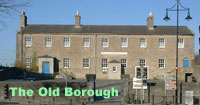Borough School
|
|
|
Seatown RoadThe Catholics then built a school on Seatown Road (Swords Youth and Resource Centre) at a cost of £800, and this school opened in 1855. The administration of the Borough School was examined by the Endowed Schools Commission in 1855 (under the chairmanship of the Earl of Kildare). In addition to the complaints about the use of Scripture, there were many other problems in the school. At one stage, there were 300 pupils in the school, and they were being taught by two teachers (Mr and Mrs Moffett) and monitors. There were allegations that a lot of corporal punishment was administered. (Children being beaten on the feet and head for not learning Scriptural History). The female pupils complained that they were forced to do needlework until 10.00 p.m. each night. They were making shirts for shops in Dublin. ComplaintsThe pupils had no copybooks because Mr Moffett had decided not to teach handwriting, but to do book-keeping instead. The Catholics were also displeased that the right to coal or medicine was confined to the recommendation of the vicar or his curate. Attendance at the Borough School was a pre-condition to any family being granted coal or medicine, and Mr Brian Shiels, Principal of Swords Boys School complained that the Superintendent of the Borough School stood outside the door of Swords Boys’ School, and refused coal, medicine and apprentice fees to families who attended the national school. The FeeThere were complaints about the “Fee” and about the frugal meal becoming a slice of bread. With all of these alleged abuses, it was clear that there was a need for action. Mr Moffett was dismissed as headmaster, and the Kildare Commission recommended that the new headmaster, Lewis Bryson (Moffett’s son-in-law) should also be dismissed. [Moffett was allowed to occupy the second master’s house as caretaker and he was retained on a salary of £20 per annum as coal distributor. He remained in Swords, and died in 1885, aged 98]. The GovernorsThe Governors of the Borough School addressed some of the complaints, and the residential qualification for the fee became 10 years for either of the pupil’s parents to have resided in the Borough. The Superintendent was asked to visit the school once per week to examine the children, but these amendments did not satisfy the Catholics. In 1863, the Governors decided that the Catholics were entitled to a share of the endowment, and they allocated them £90 out of the £721 yearly dividend. The coal yard was discontinued, the salary of the doctor was reduced from £100 to £20, and the apprentice fees were made available to Catholics. The children in both the Borough School and the National Schools were examined at Christmas and at mid-summer. The prizes for the best pupils varied from 10d (4p) to 5s (25p). It was necessary for a pupil to have attended school on 150 days and to produce a certificate of good conduct to qualify for a fee or a prize. The Rosse CommissionThe Catholics may have accepted the prizes, but they continued to complain. Another commission (the Rosse Commission, of which Sir Randolf Churchill was a member) was set up in 1879 to examine the administration of all endowed schools. One of the main spokespersons on behalf of the Catholics was Major (later Colonel) James Forster. The Rosse Report (1881) pointed to the urgent need for legislation to ensure the “proper” management of endowed schools. The Educational Endowments ActThe Educational Endowments (Ireland) Act was passed in 1885, and the governing bodies of all endowed schools were asked to submit draft schemes. The amended schemes for Swords were approved by the Lords Justice and the Privy Council on 17 October 1887. From henceforth, there would be separate schools, the Old Borough and the New Borough, and two separate governing bodies. The New Borough Schools (Catholic) were allocated a sum of £2,000 to be placed in trust for a building fund, and £24,060 Government New Three per cent stock was to be vested in the Commissioners of Charitable Donations and Bequests. The net income of the endowment was to be divided in the proportion of eleven thirteenths to the Governors of the New Borough Schools and two thirteenths to the Governors of the Old Borough Schools. |







